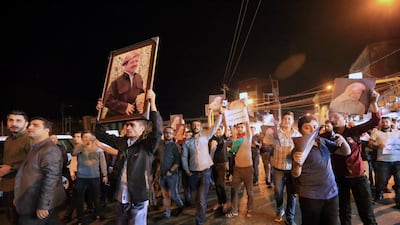Clashes raged in front of Irbil's parliament building after Masoud Barzani dissolved his powers as president just over a month after a controversial independence referendum.
An overwhelming majority of voters approved secession, which triggered fighting with Iraqi government troops who seized Kurdish-held oil rich areas.
As parliament debated his decision to stand down, some pro-Barzani supporters forced their way into the building to protest against his treatment.
The details of the situation remain unclear, but some report seeing people armed with clubs, and some gunshots have also been heard.
Journalists witnessed dozens of protesters attacking the building, parliamentarians and reporters as Mr Barzani addressed the Kurdish region in his first televised speech since the referendum's fallout turned violent earlier this month.
In the bitter TV address, he defended the independence referendum he called.
The long-time Kurdish leader blamed the central government in Baghdad for the regional crisis that followed the independence vote.
“They (Baghdad) used the referendum as an excuse. Their bad intentions were very clear from a long time ago,” he said.
“Without the peshmerga the Iraqi army would never have been able to liberate the city of Mosul,” he continued, referring to Iraqi Kurdish fighters. “We thought that the international community would reward the peshmerga and the people of Kurdistan in return. They would respect the blood of the martyrs.”
Mr Barzani’s presidential powers will be distributed between the Kurdish prime minister, Parliament and the judiciary. He informed parliament that he will not seek an extension of his term which is set to expire November 1.
However Mr Barzani's senior assistant, Hemin Hawrami said the move did not mean the Kurdish leader was “stepping down”.
Mr Barzani “will stay in Kurdish politics and lead the high political council,” Hawrami said.
Kurdish presidential elections scheduled to be held in November have been postponed indefinitely.
______________
Read more
Barzani tells Kurdish parliament he will stand down on November 1
______________
Mr Hawrami added that no political party submitted candidates to run against Mr Barzani.
The referendum on support for independence held in September has left the region increasingly isolated.
Despite warnings from Baghdad, the United States, Turkey, Iran, the United Nations and others, the vote was held on September 25 in the autonomous Kurdish zone, as well as in disputed territories claimed by Baghdad but at the time held by Kurdish forces.
Within weeks, the referendum proved to be extraordinarily costly. The region lost nearly half of the territory that had been comfortably under Kurdish control for years, including the oil-rich city of Kirkuk. The region's airspace was closed to international commercial flights, Turkey threatened the use of military force and both Iran and Turkey threatened to close border crossings vital to the land-locked region.
Mr Barzani's term expired in August 2015, after which he prevented parliament from meeting for two years, a move many of his political opponents saw as a cynical attempt to hold onto power.
As Iraq's military crumbled in the face of Islamic State group advances in 2014, Kurdish forces took control of Kirkuk. Described as the "Jerusalem of Kurdistan," by some of the region's leaders, control of the city and its oil reserves was marked as a significant achievement.
Masoud Barzani took over leadership of the Kurdistan Democratic Party in 1979 after the death of their father, Mulla Mustafa Barzani, an iconic guerrilla commander and the party's founder. He became president of the region in 2005 after the 2003 U.S.-led invasion of Iraq.

